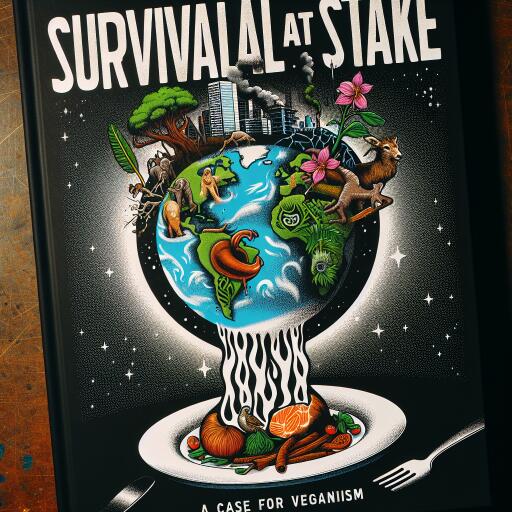
Book review: Survival at Stake makes a case for veganism
In the well-documented exploration, “Survival at Stake,” readers are confronted with a sobering overview of the various ways in which the disregard for animal welfare not only illustrates a grim picture of human cruelty but also highlights the potential peril such neglect poses to human survival itself. The undercurrent of the narrative is the compelling interconnection between our treatment of animals and the broader environmental and health crises facing our planet today.
The exploration begins with a critical look at the emergence of the Covid-19 pandemic, drawing a direct line between the unsanitary conditions in wildlife markets and the spread of zoonotic diseases. The narrative suggests that the deplorable conditions in which animals are kept are not only a recipe for disease transmission among animals but also from animals to humans, a pattern observed in outbreaks like SARS, Ebola, and Covid-19. The argument extends beyond just wildlife farms, encompassing animal experimentation and the global meat industry, underscoring a potent message: neglecting animal welfare endangers human health.
Delving into the meat industry’s impact on climate change, the narrative presents a pressing case. Chapters titled “Code Red” and “In Need of a Sea Change” unravel how animal agriculture’s expansive footprint marks a significant ecological imprint, consuming vast swathes of the Earth’s surface and contributing to a significant portion of global greenhouse gas emissions. Despite some debate over the exact figures, the looming shadow of the meat industry on environmental degradation is undeniable, with livestock forming a staggering majority of the mammalian population and significant contributions to emissions expected to rise.
The discussion expands to the waters, where the killing of large sea animals like whales not only disrupts the carbon balance by releasing stored carbon but also impacts the marine ecosystem in profound ways. The devastating effects of overfishing, including the degradation of seagrass meadows critical for carbon sequestration, are laid bare, along with the environmental toll of practices like deep-sea trawling.
Beyond the environmental implications, “Survival at Stake” sheds light on how animal cruelty reverberates through human society, affecting health, employment, and even manifesting in broader societal issues. Citing instances from the impact of tannery pollution on agriculture to the psychological scars borne by workers in industrial slaughterhouses, the narrative argues for the interconnectedness of animal welfare and human well-being.
At the heart of the discourse is the challenge to reconceptualize our dominion over animals, urging a shift towards empathy and respect, encapsulated in the advocacy for a vegan or more vegan lifestyle. However, the narrative acknowledges the complexity of this transition, exploring the intricacies of human rights and the delicate balance within ecosystems where both predators and prey play critical roles.
The book raises valid concerns about the oversimplification of veganism as a panacea for habitat destruction and biodiversity loss, pointing to examples where vegan practices inadvertently contribute to environmental challenges. The solution, it suggests, may lie in the indigenous stewardship of biodiversity, which presents a paradigm of coexistence and respect for the natural world, a stark contrast to the exploitative practices documented.
“Survival at Stake” prompts a reevaluation of the systems of governance that have allowed such exploitation to thrive, suggesting that the path forward is fraught with complexity. By charting a narrative that intertwines the fates of humans and animals, the book presents a compelling argument for the necessity of a broader ecological consciousness and a move towards practices that honor our shared planet.





Leave a Reply